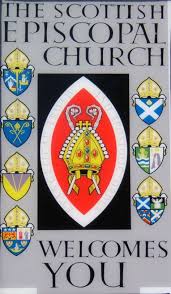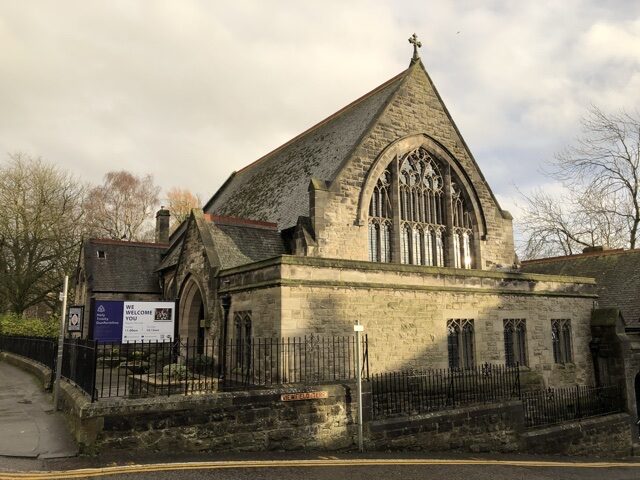
As part of the Scottish Episcopal Church, we affirm our faith during each Eucharist by saying the Nicene Creed, an ancient statement which links to the early days of the Christian Church
We believe in one God, the Father, the almighty, maker of heaven and earth, of all that is, seen and unseen.
We believe in one Lord, Jesus Christ, the only Son of God, eternally begotten of the Father, God from God, Light from Light, true God from true God, begotten, not made, of one substance with the Father. Through him all things were made.
For us men and for our salvation he came down from heaven; by the power of the Holy Spirit he became incarnate of the Virgin Mary, and was made man.
For our sake he was crucified under Pontius Pilate; he suffered death and was buried. On the third day he rose again in accordance with the Scriptures; he ascended into heaven and is seated at the right hand of the Father. He will come again in glory to judge the living and the dead, and his kingdom will have no end.
We believe in the Holy Spirit, the Lord, the giver of life, who proceeds from the Father. With the Father and the Son, he is worshipped and glorified. He has spoken through the Prophets. We believe in one holy catholic and apostolic Church. We acknowledge one baptism for the forgiveness of sins. We look for the resurrection of the dead, and the life of the world to come. Amen.
Is this an inclusive church?
At Holy Trinity, in line with the ethos of the Scottish Episcopal Church, we believe that God loves and values us all equally, no matter who we are or what we do. In response to God’s love we try to love God, and to love and accept each other wholeheartedly.
In character, the Scottish Episcopal Church is diverse. The church celebrates diversity and values dialogue alongside dogma.
This is a relatively new way of describing congregations. At Holy Trinity members of LGBT+ are welcome and everyone is treated alike. Whilst our Vestry (board) has no quotas, no one is discriminated against and we endeavour to have a gender balanced and representative group at all times.
There are increasing numbers of people who don’t think of themselves as fitting into the binary categories of male and female, or those who transition from one gender to another to feel more themselves. Holy Trinity welcomes everyone.
We have been described as a church where different disabilities are welcomed, including those that aren’t visible. For example, some people with autism find the predictable regular liturgical worship is comforting as they know what is happening next.
The congregation is increasingly diverse, welcoming people from different churches, parts of the UK and across the globe.
Whilst Holy Trinity Dunfermline and the Scottish Episcopal Church welcomes all it is also empathetic and understanding that some may not fully hold these views and they are just as welcome.
Is this an Independent Church?
Holy Trinity Dunfermline belongs to the Scottish Episcopal Church which has not been the state church since 1689. It delights in its non-established status.
It is deeply committed to civic society and public discourse. It is more a community of disciples than an institution with membership.
The SEC today pursues its calling to mission and ministry in the secular and increasingly diverse context of Scotland and the rest of the world.
The seven bishops see themselves as ‘leaders of mission’ and the church attempts to draw into its life people who are beginning to travel a journey of spirituality.
Holy Trinity Dunfermline is part of the Diocese of St Andrews, Dunkeld and Dunblane and our bishop is Very Rev Ian Paton, one of seven others in the Province.
The Scottish Episcopal Church is passionate about being the only Scottish church to be part of the Anglican Communion (which includes the US based Episcopal Church, The Anglican Church of Canada, The Church of England and many more) and has a global vision of its place in the world church. The Scottish Episcopal Church isn’t the Church of England in Scotland but we are linked through the Anglican Communion. We are also in full communion with some but not all Lutheran churches and members of the Porvoo Communion. Here at Holy Trinity our congregation comes from all over the world.
People sometimes speak of ‘discovering’ the Scottish Episcopal Church – as if they have happened upon a treasure.
The Scottish Episcopal Church is a deeply Scottish Church whose history is interwoven with the whole story of Christianity in Scotland – back to the Celtic Saints like Ninian and Columba and through the Scottish Reformation and all the turbulence which followed.
Since a large part of the Episcopal church sided with the Jacobite rebellion the SEC has often been referred to as the rebellious church and whilst we are not rebelling we can be more liberal whilst still based in tradition.
Is this a Catholic Church?
We are a Scottish Episcopal Church and this church and building has always been Episcopal. We use liturgy designed to appeal to all as a way of getting in touch with God.
This congregation is not part of the Roman Catholic Church, it belongs to the Scottish Epsicopal Church that is part of the Christian faith worldwide. Though the worship seems very similar, like using liturgy and sharing Communion, there are some differences like our church does not have a pope but is governed by Bishops. We joyfully affirm the ministry of all as priests, no matter their gender. We have different social teaching. Holy Trinity and the Scottish Episcopal Church welcome same sex couples and they can be married in our buildings and divorced people can receive communion and remarry if they wish.
Is this a Protestant church?
In the sense that we are not part of the Roman Catholic Church then some people would think of us as a Protestant church. We are one of the parts of the church that came from the Scottish reformation. Some people may say we retained more of our catholic inheritance than other reformed churches. So some would argue we are neither Protestant or Catholic and others would want to claim we are both for similar reasons. We have many in our congregation who have previously worshiped in both Protestant and Catholic churches and they find a welcoming familiar home at Holy Trinity Dunfermline.

